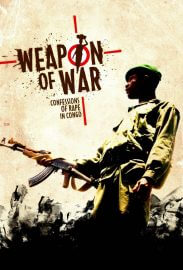
https://www.filmplatform.net/product/weapon-of-war
Wherever war breaks out, men with guns rape. Nowhere in the world reached sexual violence a scale and level of brutality as in the Democratic Republic of Congo. During the decades of conflict possibly hundreds of thousands of women and girls were systematically raped and the figure still rises.
In Weapon of War military perpetrators unveil what lies behind this brutal behavior and the strategies of rape as a war crime. The film tells the story of a soldier and a former rebel that are both looking at rape in different ways.

In Weapon of War military perpetrators unveil the hidden motives and strategies of rape as a war crime in the Democratic Republic of Congo. The film tells the story of a soldier and a former rebel that are both facing rape in different ways.
The ex-rebel explains how he forced women to have sex with him. The war had changed him into a wild animal. In an attempt to reconcile with his past, he meets one of his victims. But faced with poverty, depression and trauma, starting a normal life again proves a difficult struggle – like it is for thousands of others that participated in Congo’s bloody wars. Captain Basima is working as a priest in Congo’s army. He has made it his mission to confront perpetrators of rape with the consequences of their crimes. Despite the resistance he meets from fellow-soldiers and militia, he is determined to change their behaviour. Just like he did.
Weapon of War is a documentary with extraordinary military images, impressive interviews and very intimate portraits of rapists. By revealing this to the world, Weapon of War can move people to action and contribute to the search for solutions to end sexual violence in DR Congo.
Sexual violence in DR Congo
Wherever war breaks out, men with guns rape. But nowhere in the world reached sexual violence a scale and level of brutality as in the Democratic Republic of Congo. Possibly hundreds of thousands of women and girls were systematically raped and the figure still rises. Rape affects the stability and integrity of an entire country. Women that are victim face humiliation and rejection. The community turns its back on them at the time they most need care, security and understanding. Despite growing international attention for rape in Congo, it still is a taboo subject and continues to destroy lives and disrupt families.
Unique testimonies on rape by perpetrators
Sexual violence is in Congo usually explained from the victims’ perspective. In a unique way, Weapon of War gives Congolese soldiers and rebels that raped the opportunity to speak out about their crimes. Why and how did they do it? Do they feel regret? Do they use rape as a war strategy? The openhearted but shocking testimonies of perpetrators reveal that there are many factors that explain why rape occurs. Those include peer pressure, bad military leadership, sexual needs, fetishism and in some cases deliberate warfare strategies.
Trauma as reintegration challenge
The documentary also makes clear that conflict also has a devastating impact on the lives of perpetrators; an impact that is both cause and consequence of their violent behaviour. Combatants in Congo have experienced or participated in gruesome killings, rapes and other crimes. As a consequence they face depression, alcoholism, become aggressive or develop a Post-Traumatic Stress Disorder (PTSD). If not handled well, the reintegration of a large number of such traumatised ex-combatants into society or the national army presents a serious security risk for Congo’s future. Part of the challenge to curb such risks lies in assuring proper military training, reasonable and timely salaries for soldiers and psychosocial assistance for ex-combatants.
Educational project for Congo’s army
With the footage of ‘Weapon of War’ Ilse and Femke van Velzen are currently editing a number of educational films. These will be brought back to Congo in to educate Congo’s National Army on issues like sexual violence, military conduct and impunity. The ‘Mobile Cinema’ project, whereby the previous documentary of IFPRODUCTIONS currently circulates from village to village proofs that film is a power tool to reach out to thousands of people to stimulate public discussion.